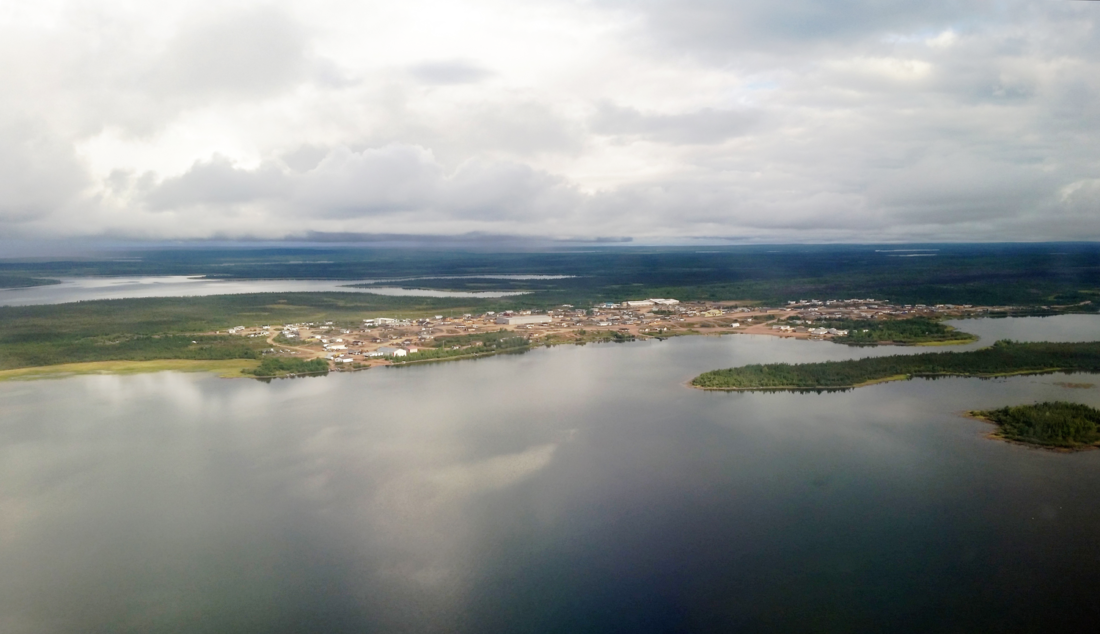Innovation a key to success in Northlands Denesuline First Nation

August 21, 2018
Treaty One Territory, Manitoba
alexpapineau
Grand Chief Arlen Dumas recently travelled to one of the most northern First Nations in all of Manitoba—the Northlands Denesuline First Nation.
This is one of two Dene First Nations in Manitoba. It is also one of two First Nations in Manitoba that fall under Treaty 10—the other Treaty 10 First Nations are located in Saskatchewan and Alberta. The only other Treaty 10 First Nation in Manitoba is called Barren Lands First Nation.
Northlands is a northern, remote, and isolated First Nation and there is no road access outside of two months in winter, when there is an ice road. It would be a 24-hour drive to get to the First Nation from Winnipeg in the winter. All other times of year, the community is accessible only by air.
Living in a remote community certainly comes with challenges. One example—Northlands is one of four Manitoba First Nations that are totally dependent on diesel fuel for energy. Diesel is often known to leak into the ground and contaminate the earth. It can also contaminate the drinking water and is challenging to remediate.

Grand Chief Dumas speaks with Chief Joe Antsanen during a visit to the community’s solar farm in August 2018.
Northland’s leadership is using innovative approaches to deal with the energy challenges, making moves to get away from dependency on diesel. Chief Joe Antsanen and the Band Councillors (Augustine Tssessaze, Lena Shaqullie, Sarazine Gazandlare, and Simon Denechezhe) are being creative and finding partners to create a stronger economy for their citizens.
Grand Chief Dumas joined Chief Antsanen for a tour of the First Nation’s renewable energy projects. The first stop was the solar farm, located close to the school.
The tour guide for the energy projects was consultant Bruce Duggan of Boke Consulting. He spoke with a passion and clarity that shows his commitment to working closely with the First Nation to help them become independent and self-sufficient when it comes to energy sources for their community.
Row upon row of solar panels—nearly 1000 panels in total—will create 20 percent of the electrical energy the community uses each year, with a positive side effect being the creation of jobs. Mr. Duggan explained the approach they took in building the solar panels in late 2017, ensuring that citizens feel a sense of ownership and pride in the project through the employment opportunities they were able to access. The hope is that this will translate into reduced/no vandalism of the site in the future.

Bruce Duggan (middle) provides a tour of the community’s energy projects.
The second project that Mr. Duggan took visitors to see is a facility where biomass energy will be produced. Wood will be burned inside the building and will heat the school and some other community buildings, replacing about 1/3 of the diesel currently consumed for heat. The diesel generator at the school will become the back-up system.
Mr. Duggan said, “Biomass energy is common in European and Hutterite communities. Instead of having to pay oil companies we can pay the Band because they will now be selling heat to the RCMP, etc.”
The Band also hopes to build a laundromat that uses energy from this biomass fuel. The visitors learned that biomass energy is cleaner than diesel fuel.
“The wood we are using is dead wood, it is not living wood,” explained Mr. Duggan. “Forest fire wood has more energy than a lot of other wood. The wood is hauled in the snow because then everything is frozen and you don’t cause lasting damage to the ground.”

Grand Chief Dumas tours the biomass project at Northlands Denesuline First Nation.
The third and fourth projects involve water. There was a visit to a small area that is the site of remediation. Diesel fuel leaked into the ground beside the community’s only school that now needs to be cleaned up. The fourth project produces geothermal energy, which takes energy from the local lake to heat and cool a group of buildings.
“One of the things I love about this community is how determined people are,” Mr. Duggan explained. “The future is local energy with local people doing the work.”
“I am so impressed and proud of this community,” said Grand Chief Dumas following the tour. He reflected on his own childhood years attending a school in northern Manitoba that sometimes needed to close due to the overwhelming smell of diesel fuel in the air. Grand Chief Dumas explained that diesel contamination is all too common in northern Manitoba communities.
“Northlands can be proud of their leadership. Chief Antsanen and the Councillors are forward-thinking when it comes to bringing alternative sources of energy into their community,” stated Grand Chief Dumas. “Northlands is leading the way forward for remote First Nations and is a community that we can look to as modelling best practices when it comes to creating local green, clean jobs.”
If you’d like to read more about Northland’s clean energy efforts, you can find more detailed information here.